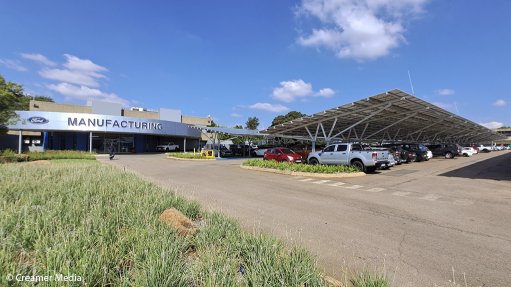
The 13.5 MW solar car port at Ford South Africa's Silverton factory.
Photo by: Creamer Media's Donna Slater
Building on its R170-million investment pledge at the South Africa Investment Conference (SAIC) in 2020, solar photovoltaic (PV) energy solutions company SolarAfrica has continued to roll out solar PV projects throughout the country.
This year’s SAIC is set to take place on April 13 in Sandton.
A major project undertaken by the company is the 13.5 MW solar PV carport grid-tied system installed at automotive original-equipment manufacturer Ford South Africa’s (Ford SA’s) Silverton factory.
With the solar PV plant, Ford SA is offsetting 35% of its electricity demand through solar and is reducing the factory’s electricity bill by 15%.
Ford Silverton assembly plant site transformation manager Rhys Davies says the partnership with SolarAfrica enables Ford SA to divert its initial investment in a major solar plant by paying it off over a number of years.
The growth in the solar PV market in South Africa has meant that, from 2011, SolarAfrica has grown from an organisation of just four people, to employing over 120 full-time staff, says SolarAfrica national sales manager Brandon Horn.
The growth has also enabled SolarAfrica to employ engineering, procurement and construction contractors to do the physical installation. SolarAfrica also has a team of ten engineers currently working full-time to undertake the engineering portion of projects.
SolarAfrica is currently building a 1 000 MW solar farm near De Aar in the Northern Cape, which is being built in 100 MW phases, the first of which is set to be brought onto the grid in 2024.
“We have already got offtakers for that energy. The first phase is pretty much sold out. The second phase is in development, and as part of that we [are] obviously securing additional clients and looking for additional land to start up new solar farms as well,” he says.
“SolarAfrica . . . [has been] instrumental in introducing [its] power purchase agreement, which is a finance option for solar, allowing businesses to invest in solar [without] having to actually put out any capital outlay itself,” says Horn.
He says the company manages to undertake such projects through investors that provide equity and debt bonds. “This allows us to raise capital to put these projects in place.”
Horn says SolarAfrica monitors and insures projects it commissions, creating a relationship with clients over a typical 20-year project agreement.
“This has been [the] last ten years in the making. Obviously, with recent events in the market, it has expanded, and it is through projects like this at Ford [that] we are really seeing great traction in South Africa.”
He explains that South African industry is struggling with numerous challenges, one being loadshedding and a high cost of grid electricity.
“As a result of industry struggling, there [are] opportunities in the renewable [energy] sector to help industry alleviate the pressure of additional costs to their businesses.
“That is really where we come into the forefront where we can assist our clients. Because we have a holistic approach from [a] wheeling [perspective],” says Horn.
“SolarAfrica is also an independent power producer . . . we produce power remotely in De Aar. We are able to wheel that power through the Eskom grid, and we can then offset utility costs that are burdening our clients in terms of overhead costs,” he says.